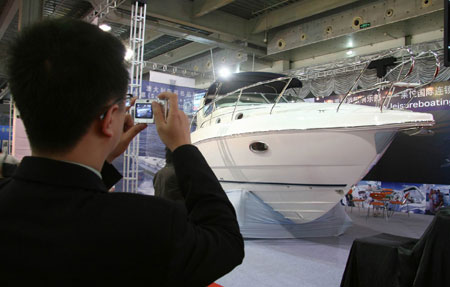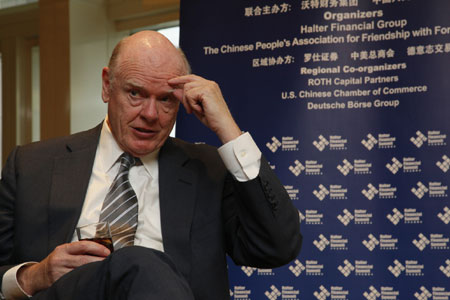BizChina
- Details
- By David Cao
- Hits: 1030
During the financial crisis that eroded international yacht orders, shipbuilder Zhangzhou Yihong Yacht Industrial Co Ltd turned adversity into advantage by transforming itself from an original equipment manufacturer (OEM) for an Italian yacht brand into a manufacturer of its own brand, the Sea Stella.
"Our overseas orders are falling sharply, but this crisis also gives us more time to make a strategic shift. In the way of building up our own brand, we are trying to provide a custom-made design to our clients, and this is proving effective," said Ren Hongting, general manager of Yihong Shanghai Experience Center.

Amid the international financial crisis, global yacht sales tumbled 45 percent in 2009, and 80 percent of yacht manufacturers were forced to suspend or shut down their operations.
Most Chinese yacht makers are export-oriented, and were affected by the global decline. A report released by the China Association of the National Shipbuilding Industry (CANSI) showed that China's shipbuilders exported a total of 1.77 million yachts and ships in 2009, worth $170 million, a sharp decline from 2.16 million yachts in the previous year.
Read more: Chinese yacht firms set sail in the domestic market
- Details
- By David Cao
- Hits: 1500
It won't be a surprise if the Chinese government soon shifts its currency policy in the light of mounting inflationary pressure in the nation, although it is up to China itself to decide the timing of any yuan revaluation, former US Treasury Secretary John Snow said on Friday.
"Over time, some continuing gradual movement in the yuan will be in China's interest; we're not pushing China, and the timing is certainly to be left to the Chinese leaders who have much better appreciation of those issues," Snow told China Daily on Friday at the Halter Financial Summit in Shanghai.

Snow made the comment amid growing speculation that China may soon resume yuan appreciation following US Treasury Secretary Timothy Geithner's visit to Beijing on Thursday. Details of his meeting with Vice-Premier Wang Qishan are unavailable, but it is widely speculated that he came to further press for yuan revaluation.
Commenting on Geithner's visit, Minister of Commerce Chen Deming said on Thursday that the US trade deficit with China, which is behind its consistent demand for yuan revaluation, is a result of its restrictive trade policies, not China's currency policy.
The market conditions and openness of an economy rather than the exchange rate policy have a major influence on which direction the trade balance swings, Chen said. China has long criticized the US for restricting high-tech exports to China, saying this contributes greatly to the US deficit with China.
- Details
- By David Cao
- Hits: 1441
General Motors Co's China sales rose to a record in March, surpassing its US deliveries for a third straight month and cementing the country's importance as the world's largest auto market.
GM, the biggest foreign automaker in China, boosted sales 68 percent to 230,048 vehicles last month, it said in a statement on Friday. That compares with a 33 percent gain for Japan's Toyota Motor Corp and a 47 percent jump by South Korea's Hyundai Motor Co. GM raised US sales 21 percent in March to 188,546.
Detroit-based GM aims to increase its China sales to 2 million vehicles this year from 1.83 million in 2009, when government subsidies helped boost the nation's auto demand 46 percent from a year earlier, surpassing the US for the first time. Industrywide sales growth in China is forecast to slow this year, even as carmakers raise production capacity.
- Details
- By David Cao
- Hits: 1146
 In 2006, things were going well for Dustin Price. The then 27-year-old American had a steady job with a construction company, a wife, a home and a Ford F250 truck.
In 2006, things were going well for Dustin Price. The then 27-year-old American had a steady job with a construction company, a wife, a home and a Ford F250 truck.
Then one day he stumbled across a website offering a teaching job in China, a position he admits he had never even considered before.
He decided to sell his house, his truck, and leave his job to come work in China.
"I wanted to experience another culture, to see another place. It wasn't necessarily in my life plan, but I decided to go for it," Price said. "All of our friends thought we were crazy."
The decision, though made for non-financial reasons, allowed Price to narrowly escape unemployment. Shortly after his departure the financial crisis struck the United States and soon all his former colleagues were out of jobs.
Staying more than a year wasn't part of the original plan, but Price and his wife have been happily working here for almost three years now.
After working as an English professor for two years in Yinchuan, Ningxia Hui autonomous region, Price decided to apply for a position at Renmin University, and secured the job. He said part of the reason he's made the decision to stay working in China is because he has been able to advance so quickly in his career.
He recognizes that there are many English teaching jobs available to expatriates who are not qualified, but says few allow for the type of advancement he has experienced.
- Details
- By David Cao
- Hits: 1017
Sugar output would drop by 530,000 tonnes to 1.7 million tonnes in Yunnan, China's second largest sugar producing area, said Deng Yi, president of the provincial sugar industry association.
The forecasted slump had pushed sugar prices to 5,200 yuan (761.8 U.S. dollars) per tonne, the highest in years, Jia said.
The rocketing prices would lead to excessive fluctuations in cane and sugar production, which was harmful to the long-term sustainable development of the industry, said Nong Guang, president of Guangxi's sugar industry association.
Read more: China's sugar output to drop about 10% amid severe drought
More Articles …
Page 61 of 120